
by Peter Boyles | Sep 29, 2014 | Blasting with Boyles

Cary Grant, Age 70
Maybe you can relate to this column, except if you have been happily married for 45 years, in which case you are the human equivalent of a unicorn.
I always described my mother and father’s marriage as being like the Vietnam war. They fought every day until they forgot why they were fighting but continued battling on anyway. I’m a big fan of Hank Williams Sr., who in the legendary country song Mind Your Own Business, declared: “Me and my old lady got a license to fight.”
I have long joked that I can’t do math and I can’t do marriage. This is not the Courtship of Eddie’s Father or Sleepless in Seattle. I can’t get it right. The protocols and practice of dating I think vary with each relationship to where you live, how old you are or whether or not you drink.
Back in the old days one of my many mantras was, “I can drink her pretty.” Or again, another country legend, Mickey Gilley’s Don’t the Girls All Get Prettier at Closing Time. I was a whirlwind at that. I couldn’t miss. There were degrees to my drinking. One of the levels arrived about nine o’clock on Friday nights when in my mind I became Robert Redford. I became bulletproof until about one-thirty in the morning when I became invisible. That worked well then. That was then, this is now.
How many really cool singles places are there for guys my age? I tried the websites. My personal favorite is bikerplanet.com, where you want to take her with you in case there’s a bar fight. I love these women, they’re my dear friends, but it’s not my idea of a partner in an intimate relationship with eyes on the future. I also gave millionaire.com a shot where everyone is a liar. But, if I had millions stashed away, I wouldn’t have to work so hard for a date.
Also, there’s the Christian singles but for a practicing pagan like myself that leaves me little room. I looked at OurTime.com but these people were born well before the Japanese hit Pearl Harbor.
I’ve tried them all and I’ve given up on matchmaking services, family as matchmakers, Ouija boards and TV shows.
Some of my friends are seeing women in their 20s. Their so-called “nieces.” We have talked about downtown Denver hotels where you can see older men saying goodnight to their “nieces.” But I think that’s a little over the top.
As guys approach septuagenarian status they like to see themselves as being Cary Grant squiring around Dyan Cannon, except they are not Cary Grant. Plus Grant and Cannon were reportedly miserable together. She divorced him before he even hit the big seven zero.
This is a quandary. I know there are many men and women my age who feel like this is the last chapter of “What’s the use.”
How do you go about being a single guy or gal in this part of our lives? I have a homosexual friend who once said to me. “Nobody loves you when you’re old and gay.” I think that’s true for straights, too.
So if you have any suggestions, let me know. We could make a fortune because I know a lot of people out there who share in my dilemma.
I have therefore decided to forget about relationships and I am going to take the time I would otherwise have devoted to dating and building a relationship to helping others. There are lots of vets from Iraq and Afghanistan with physical disabilities, PTSD and TBI that could use some support that the VA is not providing. Moreover, there are going to be a lot more on the way with our latest insane Iraqi/Syria incursion.
There are also plenty of recovering alcoholics and drug addicts down at Step 13 who, as they say, need a “hand up and not a hand out.” I have found helping others is the best way to stop worrying about myself. Moreover, you never know who you might meet when you are not looking. As the inestimable Scarlett O’Hara so pithily stated, “After all, tomorrow is another day.”
— Peter

by Mark Smiley | Sep 17, 2014 | Glendale City News
Denver Public Works plans to close some lanes near Cherry Creek Mall at 7 p.m. on Saturday, September 20. The intersection of University Boulevard and 1st Avenue will be fully closed by 10 p.m. that night.
During the closure, crews will work to complete the storm sewer and street reconstruction projects.
“A full closure of the intersection will allow the work to be completed more quickly in one single phase instead of in multiple phases as originally planned,” DPW spokeswoman Nancy Kuhn wrote. “I think it will be less impactful than doing it in several phases.”
The intersection will reopen on Tuesday, September 23, by 7 a.m.
The University/Josephine improvement project began in January 2014. With the new plan, the project is now expected to be completed on November 1.
During the closure, access to homes, businesses and the mall will be maintained throughout the closure.
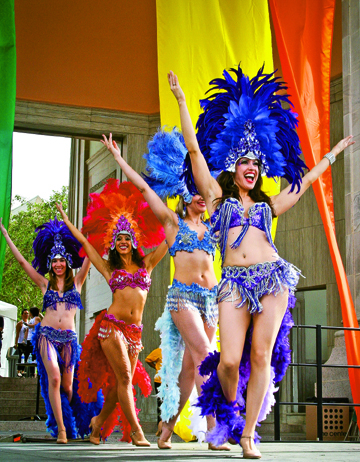
by Mark Smiley | Aug 29, 2014 | Travel
by Mark Smiley
The award-winning Bella Diva Dance is moving from Cherry Creek North to Glendale after four years at 3rd and Clayton. “It was great working with th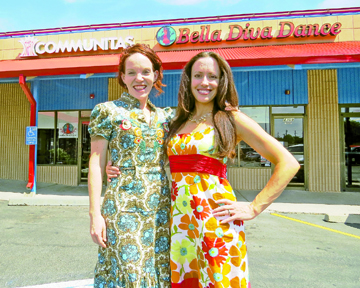 e city of Glendale. Obtaining permits is easier in a smaller city. There was not a lot of red tape,” said Caitlin Brozna-Smith, owner and founder of Bella Diva Dance Studio. They have invested over $10,000 in building a brand new dance studio in the Glendale Center located at 4309 E. Mississippi Avenue.
e city of Glendale. Obtaining permits is easier in a smaller city. There was not a lot of red tape,” said Caitlin Brozna-Smith, owner and founder of Bella Diva Dance Studio. They have invested over $10,000 in building a brand new dance studio in the Glendale Center located at 4309 E. Mississippi Avenue.
They are situated in the same shopping center where longtime Glendale businesses, Bistro Boys Catering, The Bo okies, and Dr. Proctor’s Lounge are located. Brozna-Smith’s business partner Erin Anderson shares the space with her business, Communitas.
The two met four years ago while Anderson was taking one of Brozna-Smith’s classes at the Cherry Creek Athletic Club. Communitas focuses on creating a healing space which includes massage therapy and extensive body work.
The Bella Diva Dance Studio, founded in 2010, does not focus on the traditional ballet or tap dance. Bella Diva Dance offers a unique blend of modern Egyptian, American and Lebanese style dance technique. Particular emphasis is placed on body awareness, proper alignment and clean movement execution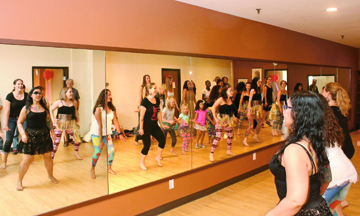 . They are a company dedicated to creating a community for belly dancers and samba dancers while elevating the art of both dance forms. They dance to share the joy and beauty of Middle Eastern and Brazilian dance through artistry, thoughtful innovation and quality classes.
. They are a company dedicated to creating a community for belly dancers and samba dancers while elevating the art of both dance forms. They dance to share the joy and beauty of Middle Eastern and Brazilian dance through artistry, thoughtful innovation and quality classes.
“Bella Diva Dance is a female empowering experience. Whether it’s attending one of the classes that push you physically to try new and exciting movements with your body, or attending a show, BDD always does a great job. I would highly recommend the classes or the shows to everyone I know,” said Valley resident Kara Thomas.
Class structure is based on a Western format of beginning with a thorough warmup including isolations and stretching, and then moving on to clear movement breakdowns, drilling the basics, hands-on corrections and integrating movements through combinations, choreography and improvisational exercises. Above all else, Bella Diva Dance celebrates the joy, femininity and individual expression inherent in Middle Eastern & Brazilian dance. Classes are taught on a monthly series-based curriculum, either being four or five classes per month. New series start the first Tuesday and Thursday of each month.
Members of the Bella Diva Dance Performing Company regularly perform at private parties, birthday and bachelorette parties, weddings, and festivals, throughout the Denver metro area. “We love to get out in the community and perform. We get an incredible response from spectators who love the uniqueness of the performances,” said Brozna-Smith.
In addition to being the owner and founder of Bella Diva Dance, Brozna-Smith is currently on faculty at the University of Denver as an Adjunct Professor of Dance and Stage Movement in the Theatre Department and Lamo nt School of Music. The Lamont School of Music is widely recognized as a premier university music performance school with a long-standing tradition of excellence.
nt School of Music. The Lamont School of Music is widely recognized as a premier university music performance school with a long-standing tradition of excellence.
This September, Bella Diva Dance will be pioneering a kids dance program offering Children’s World Dance for children ages 7-12, on Mondays, Tuesdays, and Thursdays from 4:30 p.m. to 5:30 p.m. Also in September, Bella Diva Dance is bringing in Afro-Caribe dance founder Eulanda Shead Osagiede from London to conduct an Afro-Caribe Unleashed Dance Fitness workshop during the World Dance Workshop Weekend. Afro-Caribe dance is typically joyful and free-spirited, and is often performed to Caribbean, Jamaican, highlife, jazz or soul music. The workshop will be held on Sunday, September 14 from 1 p.m. to 3 p.m.
For more information on any workshops or classes, visit Bella Diva Dance’s website at belladivadance.com or call them at 303-359-9414.
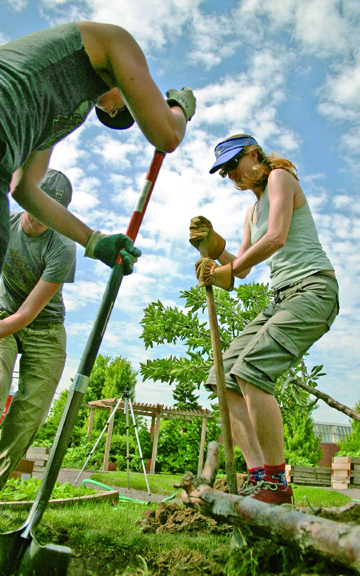
by Mark Smiley | Aug 29, 2014 | General Featured
Rules Hatched By City Council Also Allow Homegrown Sales In Kitchens, Yards Until Dusk
by Glen Richardson
Have you heard the buzz?
If not, step into your backyard and listen for the hum of bees. If you pay close attention you may also hear the sounds of chickens, ducks and goats! They’re some of the reverberations to expect as the Cherry Creek Valley rototills into full-fledged backyard farming. What’s more, anticipate that your street will also become one big Farmers’ Market as neighbors begin to sell their farm produce in their kitchens and from their front yards.
In July the Denver City Council approved a new law that allows residents to both raise and sell fresh produce they have grown themselves and “cottage foods” such as jams and honey they have made themselves in their home kitchens. Under the new law which took effect July 18, residents are required to purchase a permit but then will be able to sel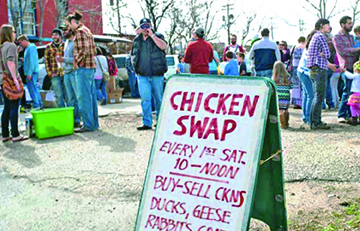 l from home raw and uncut fresh fruit, vegetables and herbs that were grown by the seller either on site or in a community garden.
l from home raw and uncut fresh fruit, vegetables and herbs that were grown by the seller either on site or in a community garden.
City Farming Rules
Urban farmers will now be able to sell whole eggs produced by chickens or ducks kept by the seller at home or as un-refrigerated food products made on-site such as spices, teas, honey, jams and certain baked goods made themselves in their home kitchens. Under the law people can sell from inside or outside their home from 8 a.m. to dusk and can sell up to $5,000 worth of goods and produce a year.
The city requires that urban farmers apply for licenses to sell their food. The city charges a one-time fee of $20 for the license. Urban farmers setting up indoor or outdoor farmer markets are not required to provide parking spaces. No sales tax is required and the seller determines the sales prices. For neighborhood farmer markets only temporary, portable furniture is allowed — tables, stands and umbrellas — for outdoor sales and they must be taken inside between dusk and 8 a.m. daily. Signs for home sales must be flat, attached to a wall or window of the home, and cannot be more than 100 square inches in size. One sign is allowed per street front (one sign for most lots, two signs for a corner lot). No moving signs and no lit sign(s) are allowed.
Several city restaurants currently grow produce in gardens and farms they own and sell them in their local eateries. Now those plus other restaurants that don’t have gardens and farms will be able to buy vegetables, eggs, jams, and fruits being grown in the neighborhood by backyard farmers.
Hatching Big Ideas
As the backyard chicken craze spreads like wildfire it’s beginning to seem like the chicken coop is the new doghouse. Increasingly Valley fidos will have to share the yard with the ladies. But before getting in a flap with your pup be aware that sales of whole, fresh chicken eggs are limited to less than 250 dozen per month.
According to rules hatched by the city, egg cartons must include the origin of the eggs and the packing date. Unless the eggs were treated to prevent salmonella, the label must include safe handling instructions: To prevent illness from bacteria, keep eggs refrigerated, cook eggs until yolks are firm, and cook any foods containing eggs thoroughly. Cartons must be labeled: “These eggs do not come from a government-approved source.”
Eggs, produce and other products sold by urban farmers must have a label and be traceable to the seller. Labels must list the name of the product, the producer’s name address, telephone number and email. Items must also include where the food was prepared or grown, the date the food was produced and a complete list of ingredients. If a product was produced in a home kitchen that is not subject to state licensure or inspection and that may also list common food allergens such as tree nuts, peanuts, eggs, soy, wheat, milk, fish and crustacean shellfish, labels should read: This product is not intended for resale.
Who’s Digging In?
Who are these upstart urban farmers with enthusiasm for having dirt under their finger nails, bees and chickens in their backyard, and fresh food in their bellies? It’s locals like Brenna Brooks-Larson, a Valley elementary school teacher who helped launch Celebration Community Farm in the Virginia Village neighborhood on the corner of Iowa and Birch. She grew up in Denver and is now a board member of UrbiCulture Community Farms. Her love for farming began in Nicaragua as a Peace Corps volunteer where she managed three school gardens. Or gardening volunteers like Maggie Rice, the second woman in Colorado to become a Certified Working Chef. She is building a Permaculture Institute on 1.5 acres 10 minutes from downtown Denver.
Also among the back-to the-land group is James Bertini, a lawyer turned farmer whose backyard on Fourth Ave. and Kalamath has chickens, rabbits and a garden plot. His interest in farming began with his wife Irena’s dissatisfaction with the prevalence of processed foods. The pair own and operate Denver Urban Homesteading — a year-round farmers market on Santa Fe — selling locally grown produce and foodstuffs. A horde of backyard farmers can be found buying chickens, rabbits and other backyard critters at a livestock exchange sponsored by the couple each month.
Many like Jason Plotkin — Farm Manager at Lowry’s Ekar Farm & Community Garden — got into farming to help neighbors and society in general. The farm hosts 50 community garden plots within the diverse Lowry neighborhood. Ekar engages 1,000 community volunteers in growing 25,000 pounds of urban organic vegetables. The farm donated 85 percent of the vegetables grown — with a market value of $95,000 — to Jewish Family Service, Weinberg Food Pantry and other food relief agencies that feed 2,500 people a month during the harvest season.
Cultivating Change
The Valley’s backyard farming boom began more than 25 years ago when the nonprofit Denver Urban Gardens (DUG) began working with the community to build and support gardening. The organization currently organizes and manages well over 100 community gardens, including 35 at Valley schools. By 1993, DUG was coordinating 21 local gardens, and by 1997, 32 new gardens and DeLaney Community Farm were established. Within the past decade it has created multiple ongoing youth and community education programs designed to assist community involvement and long-term garden sustainability.
Another significant backyard farming venture is the community farm at Valley-based Denver Green School, run by Sprout City Farms. It is a one-acre organic farm located along East Virginia Ave. Produce from the farm is used for the school salad bar as well as in cooked meals for about seven out of the nine months during the school year. The farm is able to meet nearly all the produce needs for the school kitchen from August to October. Sprout Farms believes the future of urban agriculture requires a shift in thinking, eating and acting.
Even the city has gotten into the backyard-farming act with a plot on the grounds of the Colorado Convention Center. Known as Blue Bear Farm, the 5,000-square-foot farm is located on the sunny south side of the convention building. Beds bloom with crops of fresh fruits, vegetables and herbs that are used by Centerplate chefs at the Convention Center. Basil, beans, peppers and parsnips plus radishes and raspberries are among crops grown. The farm has two beehives providing fresh honey to convention attendees.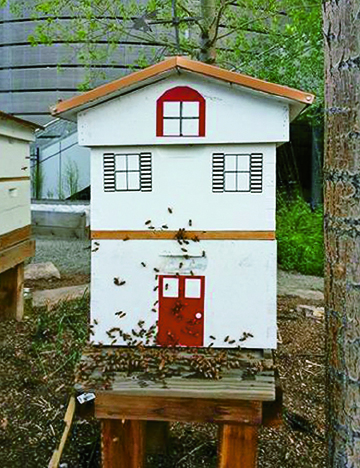






 e city of Glendale. Obtaining permits is easier in a smaller city. There was not a lot of red tape,” said Caitlin Brozna-Smith, owner and founder of Bella Diva Dance Studio. They have invested over $10,000 in building a brand new dance studio in the Glendale Center located at 4309 E. Mississippi Avenue.
e city of Glendale. Obtaining permits is easier in a smaller city. There was not a lot of red tape,” said Caitlin Brozna-Smith, owner and founder of Bella Diva Dance Studio. They have invested over $10,000 in building a brand new dance studio in the Glendale Center located at 4309 E. Mississippi Avenue. . They are a company dedicated to creating a community for belly dancers and samba dancers while elevating the art of both dance forms. They dance to share the joy and beauty of Middle Eastern and Brazilian dance through artistry, thoughtful innovation and quality classes.
. They are a company dedicated to creating a community for belly dancers and samba dancers while elevating the art of both dance forms. They dance to share the joy and beauty of Middle Eastern and Brazilian dance through artistry, thoughtful innovation and quality classes.
 l from home raw and uncut fresh fruit, vegetables and herbs that were grown by the seller either on site or in a community garden.
l from home raw and uncut fresh fruit, vegetables and herbs that were grown by the seller either on site or in a community garden.